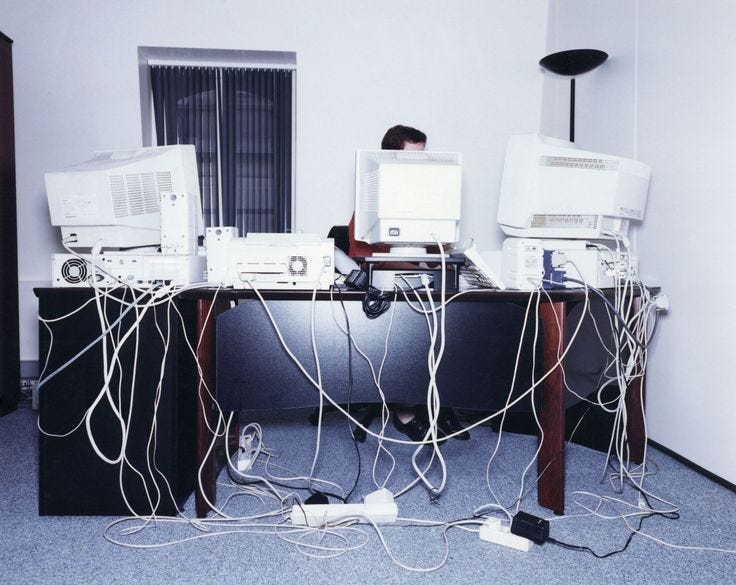The Agent Era
From Code to Convenience: The Everyday Potential of Personalized AI Agents and What It Means for Work and Relationships.
MOVEMENT 006
For those familiar with HBO's Silicon Valley, you’ll remember an episode where Gilfoyle trains his own AI bot, Anton, to manage his digital interactions with coworker and friend, Dinesh - offering a humorous, yet surprisingly prescient, glimpse into the current reality of AI agents. What was once a fictional scenario satirizing the tech world is now edging closer to everyday life as regular individuals adopt AI to streamline communication, manage relationships, and even add a touch of personality to otherwise mundane tasks.
The concept of a digital version of yourself, like Anton, might feel unsettling, but AI is already deeply integrated into daily life—and chances are, you’re interacting with it on a regular basis, whether you know it, or not.
In Work:
According to McKinsey & Company, in 2024, around 20% of employees in the Business and Legal Services sector—from mid-level managers to C-suite executives—reported using AI regularly for work-related tasks. That figure rises to approximately 60% when accounting for AI usage outside of work.
People using platforms like ChatGPT are exploring career advice tailored to their unique experiences and skills—sometimes uncovering new possibilities they hadn’t considered before. With an AI agent, it’s not far-fetched to envision it working alongside you, scouting job opportunities, or even handling low-level tasks to free up your time for bigger ambitions.
Why not take it a step further and let your AI agent handle real jobs? Platforms like OpenAI's API and Google's AutoML empower individuals to design personalized AI agents capable of tackling tasks like content creation, data analysis, and automation. These agents could realistically manage low-level remote work, opening the door to additional income streams. With seamless language translation, your professional network becomes global, allowing you to earn around the clock.
In Relationships:
In Movement 002: Parasocial Interactions, we explored the emergence of digital avatars as social media personas for individuals and brands. With the advancements in AI and the rapid growth of online dating, why not take this concept further?
With nearly 50% of young adults using dating apps and 70% of matches resulting in exclusive relationships, online dating is bridging the gap in a world where busy lifestyles leave little room for romance.
Imagine an AI agent trained on your preferences—both emotional and aesthetic—navigating various dating platforms on your behalf. It could handle the early stages, from swiping to crafting introductions, leaving you to come home from work to a curated list of potential matches, handpicked by your own digital counterpart.
How will we distinguish between real people and their carefully trained agents? Can an agent, programmed with our preferences, behaviors, and communication style, truly represent us authentically? Is there an ethical dilemma in delegating such deeply personal interactions?
If this technology grants us newfound time and freedom, will anyone even mind—or will it simply accelerate and integrate further into our lives without pause?
Market Signals:
01 Lease yourself
Under Quarantine, individuals proved the ability to work multiple jobs at once, remotely. The increased adoption and accessibility of AI will provide individuals the ability to effectively lease-out their knowledge and skill-set to perform certain tasks remotely.
02 Digital ‘Me’
The online dating landscape continues to expand, and while integrating AI into our professional life promises greater efficiency, it’s unlikely to grant us significantly more free time outside of it. Instead, this suggests that the demand for building relationships online will persist, enhanced by AI-driven tools that streamline and optimize the process.
03 Create to Expand
AI models are inherently trained on vast datasets, and the success of personalized AI agents will hinge on an individuals ability to effectively perform, organize, and generate information that is relevant to specific tasks. Equally important is the capacity to seamlessly integrate their owned-data with existing knowledge in a way that adds value and meaning to their outputs.
04 Mass Storage
^^ AI models are inherently trained on vast datasets and relatively speaking, these are the early days. The storage and computational demands required to run these types of AI models come with a significant energy and resource footprint. Experts suggest that the most viable solution may involve a renewed focus on nuclear energy.
05 ^ The Bar
If the above information proves true, those who remain on the sidelines may begin to feel a sense of falling behind and underachievement, similar to an athlete competing in a field where others are using performance-enhancing drugs. Productivity will keep accelerating, and the ability to efficiently tackle menial tasks could become the defining threshold for entry-level success or failure.







